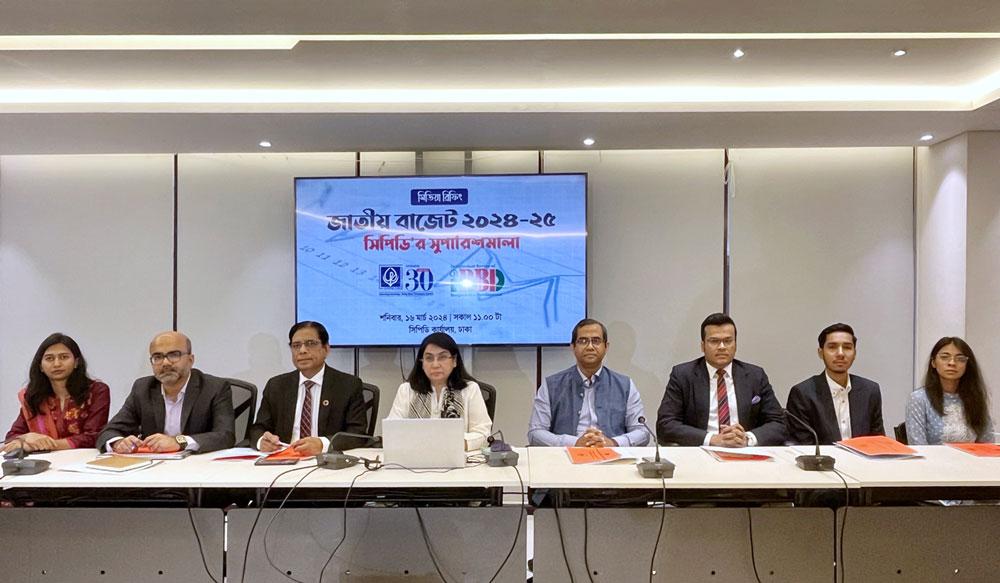A staggering BDT 820 billion shortfall looms over the 2023–24 fiscal year, as revenue collection continues to fall short of targets – following the trend of the past decade. Despite budget deficit declining, reliance on commercial banks to finance the deficit emerges as a source of concern. Inflation remains stubbornly high, exceeding 9 per cent, while indicators across key external sectors, including exports, remittances, and foreign investment, flash warning signs of economic distress.
The above-mentioned observations emerged at a media briefing titled ‘Recommendations for the National Budget FY2024-25’ on Saturday 16 March 2024, organised by the Centre for Policy Dialogue (CPD) under its flagship programme Independent Review of Bangladesh Development (IRBD).
In her keynote presentation, Dr Fahmida Khatun, Executive Director of CPD, said that restoring macroeconomic stability is the main challenge facing the policymakers, who must be cognisant of the present economic realities and identify concrete measures to address the attendant challenges.
‘The macro-budgetary framework for FY2024–25 must focus on curtailing the rate of inflation and stabilising the exchange rate’ said the Executive Director. She added that instead of Gross Domestic Product (GDP) growth, protecting the interests of vulnerable and disadvantaged groups should take the central stage.
She highlighted that ensuring complementarity between fiscal and monetary policies will be crucial, a task entrusted to both the Ministry of Finance and the Bangladesh Bank. Addressing deep-rooted structural issues is imperative for sustained macroeconomic improvement. While acknowledging current realities and designing appropriate measures are vital initial steps, the real challenge lies in implementing these measures and undertaking necessary reforms.
To achieve the desired outcomes, good governance and discipline are of paramount significance. Policymakers will inevitably face difficult decisions. However, the initial year of a political government’s tenure presents a unique opportunity to enact unpopular yet essential reforms.
While commenting on budget allocation, she said ‘Over the past 20 years, the budgetary allocation for the health sector has consistently remained below 1 per cent of GDP, signaling a lack of prioritisation of healthcare by the government’. She elaborated that in Bangladesh, the proportion of out-of-pocket expenditure as a percentage of current health expenditure surged to 74 per cent in 2020, continuing an upward trajectory observed over the past two decades. It is vital to augment the budget allocation for the sector and ensure its efficient utilisation. In addition, she emphasised that the implementation of fiscal measures is essential for enhancing public health, which can subsequently optimise social welfare. Bangladesh’s allocation for education stood at 1.76 per cent of GDP in FY2024–25, placing the country at the fifth-lowest position among the 41 least-developed countries. Given this context, the CPD recommended increasing both the allocation and utilisation of resources.
‘In the FY2022–23 budget, the gap in corporate income tax rates between listed and non-listed companies was reduced to 5 per cent, a move seen as discouraging for companies considering entry into the capital market’ highlighted Dr Khatun. She proposed reinstating the gap to 7.5 per cent.
Regarding the issue of undisclosed income, CPD suggested that instead of continuing provisions to legalise undisclosed income, more proactive actions should be taken against tax dodgers through the enforcement of appropriate laws
An open-floor Q&A session with journalists from both print and electronic media followed the discussion. The study team responded to the questions and said that one of the primary goals outlined in the present government’s election manifesto is to reduce inflation. While the government has initiated certain measures towards this objective, it is evident that inflation cannot be effectively controlled solely by imposing fines of BDT 5 million or BDT 10 million, especially when certain entities manipulate the market and generate BDT 500 million in just seven days. It is imperative that existing laws are rigorously enforced, and this enforcement must be clearly evident.



